学科教学(英语)专业考生教育硕士英语试题
045108学科教学(英语)
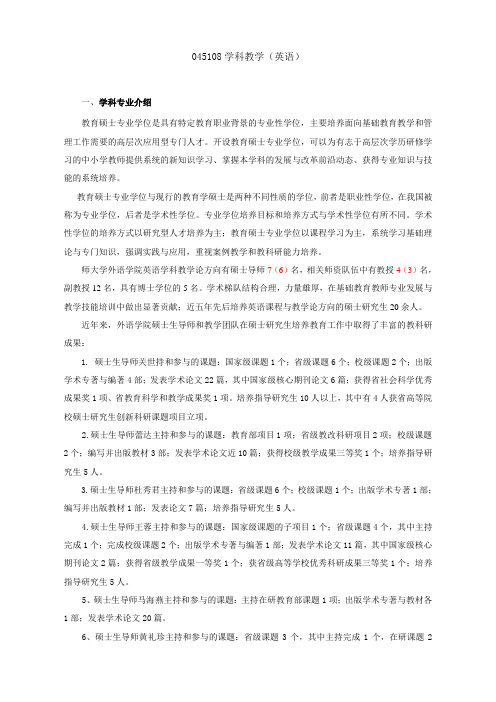
045108学科教学(英语)一、学科专业介绍教育硕士专业学位是具有特定教育职业背景的专业性学位,主要培养面向基础教育教学和管理工作需要的高层次应用型专门人才。
开设教育硕士专业学位,可以为有志于高层次学历研修学习的中小学教师提供系统的新知识学习、掌握本学科的发展与改革前沿动态、获得专业知识与技能的系统培养。
教育硕士专业学位与现行的教育学硕士是两种不同性质的学位,前者是职业性学位,在我国被称为专业学位,后者是学术性学位。
专业学位培养目标和培养方式与学术性学位有所不同。
学术性学位的培养方式以研究型人才培养为主;教育硕士专业学位以课程学习为主,系统学习基础理论与专门知识,强调实践与应用,重视案例教学和教科研能力培养。
师大学外语学院英语学科教学论方向有硕士导师7(6)名,相关师资队伍中有教授4(3)名,副教授12名,具有博士学位的5名。
学术梯队结构合理,力量雄厚,在基础教育教师专业发展与教学技能培训中做出显著贡献;近五年先后培养英语课程与教学论方向的硕士研究生20余人。
近年来,外语学院硕士生导师和教学团队在硕士研究生培养教育工作中取得了丰富的教科研成果:1. 硕士生导师关世持和参与的课题:国家级课题1个;省级课题6个;校级课题2个;出版学术专著与编著4部;发表学术论文22篇,其中国家级核心期刊论文6篇;获得省社会科学优秀成果奖1项、省教育科学和教学成果奖1项。
培养指导研究生10人以上,其中有4人获省高等院校硕士研究生创新科研课题项目立项。
2.硕士生导师蕾达主持和参与的课题:教育部项目1项;省级教改科研项目2项;校级课题2个;编写并出版教材3部;发表学术论文近10篇;获得校级教学成果三等奖1个;培养指导研究生5人。
3.硕士生导师杜秀君主持和参与的课题:省级课题6个;校级课题1个;出版学术专著1部;编写并出版教材1部;发表论文7篇;培养指导研究生5人。
4.硕士生导师王蓉主持和参与的课题:国家级课题的子项目1个;省级课题4个,其中主持完成1个;完成校级课题2个;出版学术专著与编著1部;发表学术论文11篇,其中国家级核心期刊论文2篇;获得省级教学成果一等奖1个;获省级高等学校优秀科研成果三等奖1个;培养指导研究生5人。
学科教学硕士(英语类)
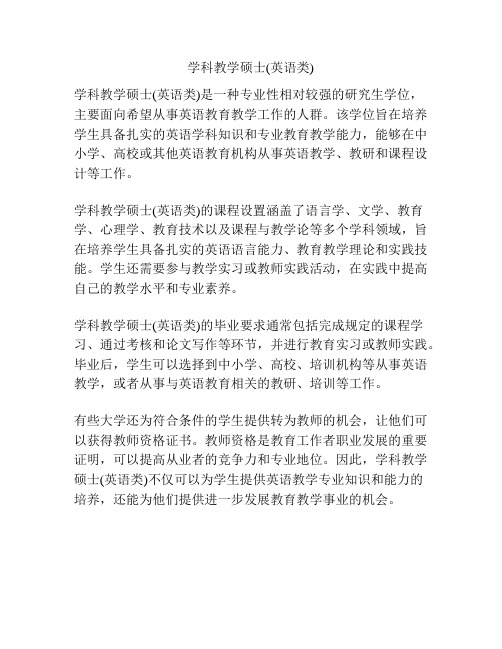
学科教学硕士(英语类)
学科教学硕士(英语类)是一种专业性相对较强的研究生学位,
主要面向希望从事英语教育教学工作的人群。
该学位旨在培养学生具备扎实的英语学科知识和专业教育教学能力,能够在中小学、高校或其他英语教育机构从事英语教学、教研和课程设计等工作。
学科教学硕士(英语类)的课程设置涵盖了语言学、文学、教育学、心理学、教育技术以及课程与教学论等多个学科领域,旨在培养学生具备扎实的英语语言能力、教育教学理论和实践技能。
学生还需要参与教学实习或教师实践活动,在实践中提高自己的教学水平和专业素养。
学科教学硕士(英语类)的毕业要求通常包括完成规定的课程学习、通过考核和论文写作等环节,并进行教育实习或教师实践。
毕业后,学生可以选择到中小学、高校、培训机构等从事英语教学,或者从事与英语教育相关的教研、培训等工作。
有些大学还为符合条件的学生提供转为教师的机会,让他们可以获得教师资格证书。
教师资格是教育工作者职业发展的重要证明,可以提高从业者的竞争力和专业地位。
因此,学科教学硕士(英语类)不仅可以为学生提供英语教学专业知识和能力的
培养,还能为他们提供进一步发展教育教学事业的机会。
2009年教育硕士考试英语二试卷一A真题及答案
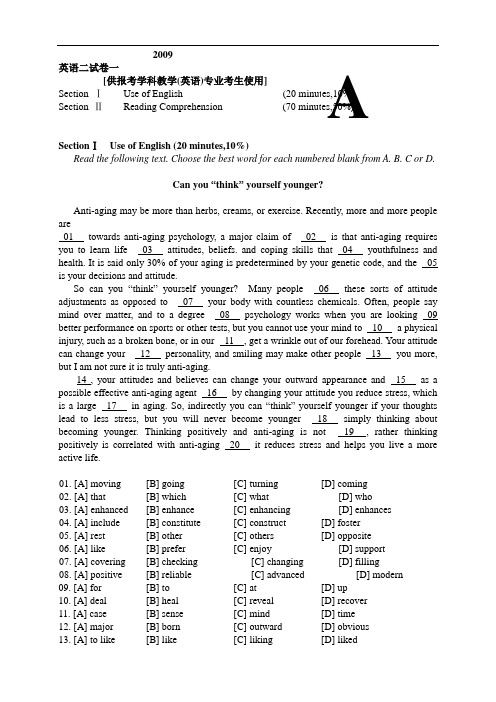
2009英语二试卷一A[供报考学科教学(英语)专业考生使用]Section ⅠUse of English (20 minutes,10%)Section ⅡReading Comprehension (70 minutes,50%)SectionⅠUse of English (20 minutes,10%)Read the following text. Choose the best word for each numbered blank from A. B. C or D.Can you “think” yourself younger?Anti-aging may be more than herbs, creams, or exercise. Recently, more and more people are01 towards anti-aging psychology, a major claim of 02 is that anti-aging requires you to learn life 03 attitudes, beliefs. and coping skills that 04 youthfulness and health. It is said only 30% of your aging is predetermined by your genetic code, and the 05 is your decisions and attitude.So can you ―think‖yourself younger? Many people 06 these sorts of attitude adjustments as opposed to 07 your body with countless chemicals. Often, people say mind over matter, and to a degree 08 psychology works when you are looking 09 better performance on sports or other tests, but you cannot use your mind to 10 a physical injury, such as a broken bone, or in our 11 , get a wrinkle out of our forehead. Your attitude can change your 12 personality, and smiling may make other people 13 you more, but I am not sure it is truly anti-aging.14 , your attitudes and believes can change your outward appearance and 15 as a possible effective anti-aging agent 16 by changing your attitude you reduce stress, which is a large 17 in aging. So, indirectly you can ―think‖ yourself younger if your thoughts lead to less stress, but you will never become younger 18 simply thinking about becoming younger. Thinking positively and anti-aging is not 19 , rather thinking positively is correlated with anti-aging 20 it reduces stress and helps you live a more active life.01. [A] moving [B] going [C] turning [D] coming02. [A] that [B] which [C] what [D] who03. [A] enhanced [B] enhance [C] enhancing [D] enhances04. [A] include [B] constitute [C] construct [D] foster05. [A] rest [B] other [C] others [D] opposite06. [A] like [B] prefer [C] enjoy [D] support07. [A] covering [B] checking [C] changing [D] filling08. [A] positive [B] reliable [C] advanced [D] modern09. [A] for [B] to [C] at [D] up10. [A] deal [B] heal [C] reveal [D] recover11. [A] case [B] sense [C] mind [D] time12. [A] major [B] born [C] outward [D] obvious13. [A] to like [B] like [C] liking [D] liked14. [A] Therefore [B] However [C] Although [D] Furthermore15. [A] are [B] find [C] play [D] act16. [A] unless [B] but [C] if [D] after17. [A] problem [B] factor [C] issue [D] question18. [A] when [B] for [C] by [D] with19. [A] cause [B] caused [C] causing [D] causation20. [A] because [B] while [C] whether [D] howSectionⅡReading Comprehension (70 minutes, 50%)Part ARead the following text and answer the questions by choosing A, B, C or D.The True Meaning of Self-HelpAccording to self-help expert Tony Robbins, walking barefoot across 1,000-degree red-hot coals ―is an experience in belief. It teaches people in the most intuitive sense that they can do things they never thought possible.‖I’ve done three fire walks myself, without chanting ―cool moss‖or thinking positive thoughts. I didn’t get burned. Why? Because charcoal is a poor conductor of heat, particularly through the dead calloused skin on the bottom of your feet and especially if you walk across the bed of coals as quickly as fire walkers are likely to do. Physics explains the ―how‖ of fire walking. To understand the ―why,‖ we must turn to psychology.In 1980 I attended a bicycle industry trade convention whose keynote speaker was Mark Victor Hansen, well known coauthor of the wildly popular Chicken Soup for the Soul book series. I was surprised that Hansen didn’t require a speaker’s fee, until I saw what happened after his talk; people were lined up out the door to purchase his motivation tapes. I listened to those tapes over and over during training rides in preparation for bicycle races.The ―over and over‖ part is the key to understanding the ―why‖ of what journalist Steve Salerno calls the Self-Help and Actualization Movement (SHAM). In his recent book: How the Self-Help Movement Made America Helpless, he explains how the talks and tapes offer a momentary lift of inspiration that fades after a few weeks, turning buyers into repeat customers. Surrounding SHAM is a builetproof shield: if your life does not get better, it is your fault--your thoughts were not positive enough. The solution? More of the same self-help--or at least the same message repackaged into new products. Consider the multiple permutations of John Gray’s Men Are from Mars, Women Are from Venus. SHAM takes advantage by cleverly marketing the dualism of victimization and empowerment. SHAM experts insist that we are all victims of our wild and cruel ―inner children‖ who are produced by painful pasts that create negative ―tapes‖ that replay over and over in our minds. Liberation comes themselves, for prices that range from $500 one-day work-shops to Robbins’s $5,995 ―Date with Destiny‖ seminar. Do these programs work? No one knows. According to Salerno, no scientific evidence indicates that any of the countless SHAM techniques—from fire walking to 12-stepping—works better than doing something else or even doing nothing . The law of large numbers means that given the millions of people who have tried SHAMs. Inevitably some will improve. As with alternative, ineffective medicine, the body naturally heals itself and whatever the patient was doing to help gets the credit. Patient, heal thyself—the true meaning of self-help.21. What does Tony Robbins say about fire walks?[A] Fire walkers are actually cheaters.[B] Fire walkers should have experience.[C] Fire walking is a special experience.[D] Fire walking requires much self-confidence.22.‖…turning buyers into repeat customers‖ implies[A] SHAM may lead to a dramatic shopping inspiration.[B] SHAM believers buy more books of similar content.[C] usually SHAM will only last for several weeks.[D]tapes of Steve Salerno’s talks are sold at different time.23.the advantage that SHAM takes is possibly the[A] economic benefit.[B] scientific advances.[C] public indulgence.[D] believers’ vulnerability.24. What is the author’s attitude towards SHAM?[A] Critical.[B] Understanding.[C] Admiring.[D] Indifferent.25. The purpose of mentioning the prices (for prices that range from $500 … to …$5,995 …) is to[A] tell readers the actual cost of such activities.[B] satirize the high cost and a not-much-useful activity.[C] recommend some of the worthwhile soul trainings.[D] show the quality discrepancy among such activities.26. Which of the following statements would the author agree with?[A] SHAM will work together with certain medicine.[B] SHAM techniques are better than other techniques.[C] SHAM may work for only a small number of people.[D] SHAM works as effectively as physical healing.Part BYou are going to read an extract about the work of the Master of Ceremony. Six paragraphs have been removed from the extract. Choose from paragraphs A-G the one which fits each gap (27-32). There is one extra paragraph which you do not need to use .Preparation for the Master of CeremonyThe Master of Ceremony (MC) performs a variety of duties during a program. As theMC you are responsible for getting things started, keeping the program moving, and closing the meeting. All that occurs between the opening and closing is your responsibility.27As in preparing for any speaking situation, it may work to your advantage to outline the program and then the ―body‖of the presentation before you prepare your introduction and conclusion. In some instances, however, your welcome may be an established custom, and is preparation may well be your first and easiest task.28In preparing the welcome, remember to start on time. Then, greet your guests and fellow members. Briefly make your remarks welcoming all present. Never let your welcome be presented impromptu. Plan ten wording carefully as your beginning is likely to set the mood for the entire program. If you are serious or humorous, the atmosphere will have thus been set for the occasion.29On the other hand, you don’t want people waiting for a speaker long after they have completed their dessert. It is best to prepare a time schedule for your entire program, check it with your caterer and speakers, and then stick to it as closely as you can.3As you arrange the program, have a reason for putting one event or speaker first, another second, and so on. This will help you provide continuity and will help the audience to see connections between speakers. In some instances, you may need to provide impromptu remarks to tie one speaker’s presentation to the next speaker.31Finally, as you prepare for the closing, review the suggestions in chapter 33 for the farewell speech. While the two are not exactly the same, there are similarities. Even the best program needs some sense of finality. Don’t simply dismiss your audience; you need to take a few seconds and thank the audience and tie the program to them one final time. Plan a way of tying the program to something in the future, and point out the benefits of having attended meeting.32As you can see, the preparation for being an MC is very extensive and needs to be planned carefully. Nothing should be left to chance. On the other hand, you should also prepare to speak, change, and adapt to the circumstances of the situation at hand. Adapt to the specific remarks of the speakers.[A] Next, prepare your introductions and transitional remarks so they tie your programtogether and provide continuity. When you speak, make your comments brief and related to the speeches or events that have just occurred or are about to take place.[B] It is essential that you keep a constant reminder that your purpose as MC is to; get thingsstarted, keep the program moving, and close the meeting. Resist any temptation during your preparation to think the audience has come to hear you. Whatever the occasion, you are not the featured speaker, so you will not want to ―spotlight‖ your speeches.[C] As you introduce speakers, remember, it is your responsibility in introducing speakers toarouse interest in the speaker and the speaker’s topic. Again, try to avoid lengthy or toobrief introductions. Otherwise, you may find yourself in a predicament by having used too much of the speaker’s time or not have properly prepared the audience for the speaker.[D] As a follow-up, stop and shake hands and thank all of your guest speakers again. Let themknow that you are pleased with their performance and appreciate their help in making your job easy and enjoyable. Wait until all guests have departed before leaving. It is generally rude and impolite for the MC to leave the banquet or dinner before the special guests.[E] Sometimes the MC has other responsibilities within the organization. These duties mustalso be maintained. Handle these first, so the duties do not interfere with your responsibilities as MC. Once you have accounted for your official duties, you can begin to prepare for the responsibilities of being MC.[F] Once the program is under way, it is your responsibility to see that things keep moving.Try to avoid long gaps of time between events, but you don’t want to rush things too quickly either. If it is a dinner or banquet, you don’t want to have people eating their main course while the guest is speaking.[G] On some occasions, you may also need to prepare yourself for either presenting orreceiving awards or gifts. As in the other speeches by the MC, these speeches are generally brief. All you need to do is to highlight the honoree and stimulate the audience to appreciate the person being honored.Part CYou are going to read a passage about habits. From the list of headings A – G. choose the best one to summarize each paragraph (33-38) of the passage. There is one extra heading that you do not need to use.Habits are bad only if you can’t handle them33We are endlessly told we’re creatures of habit. Indeed, making this observation as if it were original is one of the most annoying habits of pop psychologists. The psychologist William James said long ago that life ―is but a mass of habits …our dressing and undressing, our eating and drinking. our greetings and partings. our giving way for ladies to precede are things of a type so fixed by repetition as almost to be classed as reflex actions.‖What pop psychology can’t decide, though, is whether this state of affairs is good or bad. Are habits, properly controlled, the key to happiness? Or should we be doing all we can to escape habitual existence?34This isn’t a question of good versus bad habits: we can agree, presumably, that the habit of eating lots of vegetables is preferable to that of drinking a three-litre bottle of White Lightning each night. Rather, it’s a disagreement about habituation itself. Since habit is so much more powerful than our conscious decision-making. What are needed are deliberately chosen routines. No matter how hard you resolve to spend more time with your spouse, it’ll never work as well as developing the habit of a weekly night out or of doing the hardest task first each morning.35You on the other hand, as we know all too well, habits lose their power precisely because they’re habitual. An expensive cappuccino, once in a while, is a life-enhancing pleasure; an expensive cappuccino every day soon becomes a boring routine. Even proven therapeutic techniques. such as keeping a diary, work better when done occasionally, not routinely.36I don’t have an answer to this dilemma. But there is one way to get the best of both worlds: develop habits and routines that are designed to disrupt your habits and routines, and keep things fresh. One obvious example is the ―weekly review‖, which time-management experts are always recommending: a habit, yes, but one that involves stepping out of the daily habitual stream to gain perspective. Or take Bill Gates’s famous annual ―think week‖, in which he holes up in the mountains with a stack of books and journals, to reflect on future paths of action. You don’t need a week in the mountains, though: an hour’s walk in the park each week might prove as beneficial.37A smaller-scale kind of routinised disruption is a method known as burst working, involving tiny, timed sprints of 5 to 10minutes, with gaps in between. Each burst brings a microscopic but refreshing sense of newness, while each tiny deadline adds useful pressure, preventing a descent into torpor. Each break, meanwhile, is a moment to breathe – a miniature ―think week‖, to step back, assess your direction, and stop the day sliding into forgetfulness. 38All these techniques use the power of habituation to defeat the downsides of habituation. Like jujitsu (柔道). You’re turning the enemy’s strength against him; unlike jujitsu, we physically malcoordinated types can do it, too.[A] Breaking routines does not need a lot of time[B] Things done too much lose their value.[C] Psychologists are not sure about the value of habits.[D] It is possible to change habits deliberately.[E] Disrupting habits and routines may lead to fresh ideas.[F] There is a way out from habituation.[G] Habits are indication of laziness.Part DYou are going to read a passage about productive postponement. Decide whether the statements in the box agree with the information given in the passage. You should choose from the following:A Yes = the statement agrees with the information in the passageB No = the statement contradicts the information in the passageC NOT GIVEN = there is no information on this in the passageProductive postponementIt’s frustrating irony of the universe that the way to get something you really want is often not to want is so badly. Worry too hard about a task and the anxiety will prevent you performing your best: stop looking for love, goes the cliché, and that’s when you’ll find it. Try too hard to be happy and you’ll find yourself on a misery-inducing treadmill (单调的工作) of self-improvement efforts, contradictory advice and motivational seminars conducted by exceptionally dubious men in hotel ballrooms.The solution is to ―leg go‖ of worry, of seeking happiness. But implementing that advice is close to impossible: it’s a tall order just to stop feeling anxious or to stop wanting something you want. Mercifully, some authors offer a far more palatable alternative: instead of getting embroiled in trying to let go of thoughts and emotions that get in your way, postpone them instead.Understandably, putting things off has often been considered as undesirable: see the bestseller Excuse Me, Your Life Is Waiting and similar warnings not to ―postpone your dreams‖. But there’s a flipside –a technique you might call productive postponement. The psychiatrist Robert Leahy, for example, recommends ―worry postponement‖; writing down your worrier as they arise, and scheduling time to fret. It sounds strange, but there’s researchevidence for it, and logic: we worriers derive huge payoffs from worrying – we believe, on some level, that it makes things go better – and so the idea of giving if up can be terrifying. Just putting it off, safe in the knowledge that you can return to it later, is easier. (If you’re worried you’ll forget to worry, consider an email reminder service, and if worrying you’ll forget to worry strikes you as absurd, well. consider yourself lucky and welcome to my world.)Psychotherapists call techniques such as postponement ―metacognitive‖, meaning that they make you aware of your habitual thought processes, and therefore work more lastingly than, say, trying to relieve a particular worry by addressing its specific content. Postponement works with perfectionism, too. If you can’t get rid of the notion that some task must be done perfectly, can you suspend that requirement just for now, resolving to revert to your perfectionism at some predetermined point in the near future? The essayist Anne Lamott, in her book Bird By Bird, calls this the principle of ―shitty first drafts‖. but, like so much of her counsel, it applies beyond writing.NotNo givenYes39 The more we try to get something, the more difficult if[A] [B] [C]becomes.40 It is advisable to give up what we are looking for. [A] [B] [C]41 Temporarily postponing things may be a good way to[A] [B] [C]get what we want.42 If you forget your worries. They will disappear. [A] [B] [C]43 Most people forget about their worries if they[A] [B] [C]postpone worrying about them.44 If you want to do things perfectly, you have to[A] [B] [C]postpone.45 Sometimes things can be done better when postponed. [A] [B] [C]。
教育硕士(英语)(045108)专业学位研究生培养方案
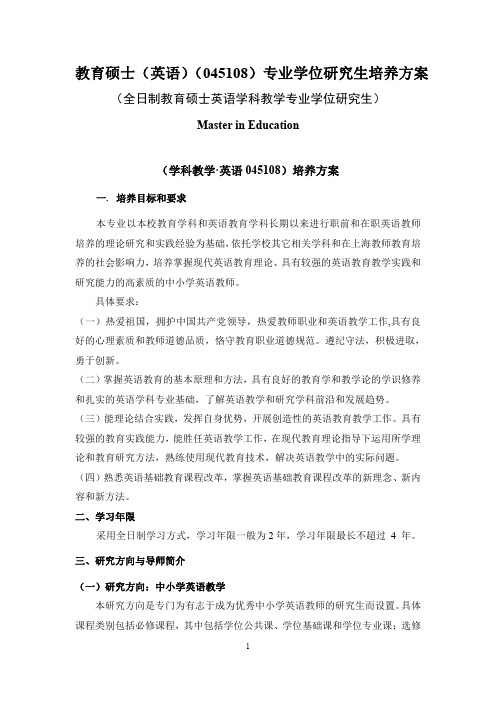
教育硕士(英语)(045108)专业学位研究生培养方案(全日制教育硕士英语学科教学专业学位研究生)Master in Education(学科教学·英语045108)培养方案一.培养目标和要求本专业以本校教育学科和英语教育学科长期以来进行职前和在职英语教师培养的理论研究和实践经验为基础,依托学校其它相关学科和在上海教师教育培养的社会影响力,培养掌握现代英语教育理论、具有较强的英语教育教学实践和研究能力的高素质的中小学英语教师。
具体要求:(一)热爱祖国,拥护中国共产党领导,热爱教师职业和英语教学工作,具有良好的心理素质和教师道德品质,恪守教育职业道德规范。
遵纪守法,积极进取,勇于创新。
(二)掌握英语教育的基本原理和方法,具有良好的教育学和教学论的学识修养和扎实的英语学科专业基础,了解英语教学和研究学科前沿和发展趋势。
(三)能理论结合实践,发挥自身优势,开展创造性的英语教育教学工作。
具有较强的教育实践能力,能胜任英语教学工作,在现代教育理论指导下运用所学理论和教育研究方法,熟练使用现代教育技术,解决英语教学中的实际问题。
(四)熟悉英语基础教育课程改革,掌握英语基础教育课程改革的新理念、新内容和新方法。
二、学习年限采用全日制学习方式,学习年限一般为2年,学习年限最长不超过4年。
三、研究方向与导师简介(一)研究方向:中小学英语教学本研究方向是专门为有志于成为优秀中小学英语教师的研究生而设置。
具体课程类别包括必修课程,其中包括学位公共课、学位基础课和学位专业课;选修课程;实践实习与学位论文;以及补修课程。
必修课程围绕获得学位需要完成的英语基础教育教师所必需掌握的教育教学原理、课程与教学基础理论、中小学教育研究方法、青少年心理发展与教育、英语课程与教材分析、英语教学理论与方法、英语教学设计与案例分析、英语教育测量与评价,着重对各教学环节和要素的设计和实践操控能力等的培养,是本专业学位的主干课程体系。
教育硕士专业学位(学科教学英语)

全日制教育硕士专业学位研究生培养方案与实施细则学科教学(英语)(外文学院2015年7月修订)一、培养目标培养掌握现代教育理论、具有较强的教育教学实践和研究能力的高素质的中小学英语课程专任教师与从事相关工作的教育教学管理人员。
具体要求为:1、拥护中国共产党的领导,热爱教育事业,具有良好的道德品质,遵纪守法,积极进取,勇于创新。
2、具有良好的学识修养和扎实的专业基础,了解学科前沿和发展趋势。
3、具有较强的教育实践能力,能胜任英语教育教学工作,在现代教育观念指导下运用所学理论和方法,熟练使用现代教育技术,解决教育教学中的实际问题;能理论结合实践,发挥自身优势,开展创造性的教育教学工作。
4、熟悉基础教育课程改革,掌握基础教育课程改革的新理念、新内容和新方法。
5、能熟练阅读本专业英语文献。
二、学习年限及课程设置全日制教育硕士(学科教学·英语)学习年限一般为3年;课程设置分为学位基础课,专业必修课,选修课程,实践教学,学术报告四个模块;总学分不少于38学分。
三、实践教学实践教学时间原则上不少于1年。
实践教学包括教育实习、教育见习、微格教学、教育调查、课例分析、班级与课堂管理实务等实践形式,其中到中小学进行实践活动的时间不少于半年。
四、教育方式本专业重视理论与实践相结合,采用课堂参与、小组研讨、案例教学、合作学习等多种方式相结合。
本专业建有稳定的教育实践基地,并聘请了多位校外兼职教育硕士导师。
五、学位论文与学位授予(一)学位论文选题应紧密联系基础教育实践,来源于中小学英语教育教学中的实际问题。
论文形式可以多样化,如调研报告、案例分析、校本课程开发、教材分析、教学案例设计等,字数不少于1.5万字。
(二)修满规定学分,并通过论文答辩者,经学位授予单位学位评定委员会审核,授予教育硕士专业学位,同时获得硕士研究生毕业证书。
六、其它非师范类专业毕业生入学后,应至少补修3门教师教育课程(如教育学,心理学、学科教学论),不计学分。
教育部直属六所师范类院校教育硕士 学科教学(英语)专业招生人数、考试科目、参考书目

教育部直属师范类院校学科教学(英语)招生人数、考试科目、参考书目一、北京师范大学招生人数:15人(此为2012年招生人数,推免生占百分之三十至五十)考试科目:101-思想政治理论(满分100分)、204-英语二(满分100分)、333-教育综合(满分150分)、866-语言学与英语教学(满分150分)参考书目:1.语言研究(第2版)(The Study of Language, 2nd edition),George Yule 著,外语教学与研究出版社,2000。
2.《外语学习与教学导论》,Keath Johnson著,外语教学与研究出版社,2002年。
3.《英语教学法教程》第2版,王蔷主编,高等教育出版社,2006年。
4.【教育学原理】王道俊、郭文安主编:《教育学》,人民教育出版社2009年5.【中国教育史】(1)孙培青主编:《中国教育史》,华东师范大学出版社2009年版(2)王炳照等著:《简明中国教育史》,北京师范大学出版社2007年版6.【外国教育史】张斌贤主编,王晨副主编:《外国教育史》,教育科学出版社2008年7.【教育心理学】(1)张大均主编:《教育心理学》,人民教育出版社2005年(2)陈琦、刘儒德主编:《教育心理学》,高等教育出版社2005年2012年招生简章:/ReadNews.aspx?NewsId=11072508488二、东北师范大学招生人数:复试前公布各专业招生人数考试科目:①101思想政治理论②204英语二③333教育综合④890英语教学专业基础参考书目:1.Principles of Language Learning and Teaching H. D. Brown 外语教学与研究出版社 2008年2.Introducing Linguistics 杨忠高等教育出版社3.333教育综合参考书目同北京师范大学。
研究生院网站:/zhaosheng/index.php?classid=3专业目录:/zhaosheng/shuoshi/ssml.php?zsnf=2012三、华东师范大学、招生人数:10人考试科目:初试①101思想政治理论②201英语一③333教育综合④913综合英语(A)(内容难度同专八)复试:1.英语写作(笔试)。
福建师范大学非全日制教育硕士英语学科教学专业基础课入学考试试卷
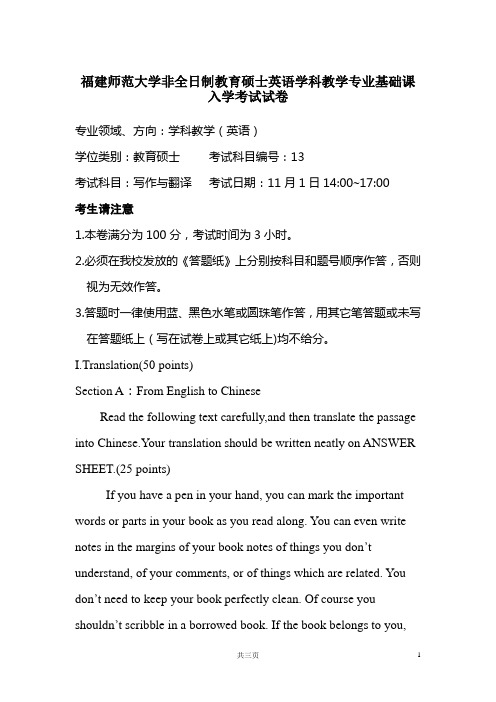
福建师范大学非全日制教育硕士英语学科教学专业基础课入学考试试卷专业领域、方向:学科教学(英语)学位类别:教育硕士考试科目编号:13考试科目:写作与翻译考试日期:11月1日14:00~17:00考生请注意1.本卷满分为100分,考试时间为3小时。
2.必须在我校发放的《答题纸》上分别按科目和题号顺序作答,否则视为无效作答。
3.答题时一律使用蓝、黑色水笔或圆珠笔作答,用其它笔答题或未写在答题纸上(写在试卷上或其它纸上)均不给分。
I.Translation(50 points)Section A:From English to ChineseRead the following text carefully,and then translate the passage into Chinese.Your translation should be written neatly on ANSWER SHEET.(25 points)If you have a pen in your hand, you can mark the important words or parts in your book as you read along. You can even write notes in the margins of your book notes of things you don’t understand, of your comments, or of things which are related. You don’t need to keep your book perfectly clean. Of course you shouldn’t scribble in a borrowed book. If the book belongs to you,feel free to write in the spare space--at the top, the sides of,at the bottom of the page. Have you heard of an expression “read between the lines” which means you as a reader should search for the hidden meanings and messages? Here you should also “write between the lines”. It’s absolutely wrong to think that writing in a book is doing the book some damage. On the contrary, you are showing your interest, appreciation or sometimes disapproval for what’s in the book. You are actually getting the most value from the money you spent on the book. The notes in the margins will help you recall your thoughts more quickly.Section B: From Chinese to EnglishRead the following text carefully, and then translate the passage into English. Your translation should be written neatly on ANSWER SHEET. (25 points)近年来随着国内和国际形势的发展,中国正在全面融入经济全球化的浪潮当中,外语教育已经成为世界各个国家公民教育的一个重要组成部分,因此外语师资培训的重要性和紧迫性与日俱增。
学科教学硕士(英语类)

学科教学硕士(英语类)
摘要:
一、学科教学硕士(英语类) 简介
1.定义与背景
2.培养目标
3.就业方向
二、学科教学硕士(英语类) 课程设置
1.必修课程
2.选修课程
三、学科教学硕士(英语类) 申请条件
1.学术背景要求
2.语言能力要求
3.其他申请材料
四、学科教学硕士(英语类) 的就业前景
1.就业领域
2.职业发展
3.薪资待遇
正文:
学科教学硕士(英语类) 是一个针对英语学科教学的专业硕士学位。
该学位旨在培养具有扎实英语语言基础、熟悉英语教学理论及方法、具备一定教育科研能力的人才。
学科教学硕士(英语类) 毕业生主要就业方向为中小学英语
教师、教育培训机构英语教师及教育管理人员等。
学科教学硕士(英语类) 的课程设置包括必修课程和选修课程。
必修课程主要包括英语语言知识与技能、英语教学理论与方法、教育心理学、教育科学研究方法等。
选修课程则根据不同学校的特色和教育需求进行设置,如英语文学、英语语言学、英语翻译、英语写作等。
申请学科教学硕士(英语类) 需要具备一定的学术背景和语言能力。
通常要求申请者具有英语、教育或相关专业的本科学历,以及良好的英语听说读写能力。
此外,申请者还需要提交个人陈述、推荐信等材料。
毕业生在取得学科教学硕士(英语类) 学位后,可在中小学、教育培训机构、教育管理部门等场所从事英语教学工作。
随着教育行业的发展,英语教师的需求持续增长,因此学科教学硕士(英语类) 毕业生的就业前景较为广阔。
在职业发展方面,教师可以通过经验积累和职称评定不断提升自己的地位和薪资待遇。
2021鲁东大学学科教学(英语)(教育硕士专业学位)考研真题经验参考书

现在,已经完成了考验。
感觉轻松很多,希望一起努力。
政治:大家都知道紧跟李凡老师的步伐,不用开始的太早,听他的课真的是有趣,他也是超级厉害的,政治的话我后期看一章《政治新时器》,做题,李凡的书很贴心,让你知道错在哪,怎么才能对,我也后来跟进了李凡的押题班,了解时事政治,答题思路,当然后期冲刺卷,押题卷都是要做的,还要模拟考试,把握时间。
我政治花的时间最少,买了题目也都没看,就前期跟着学了李凡的网络课程,最后快考试看了看《政治新时器》(推荐!),政治就不多说了。
英语:单词是基础,《一本单词》完全能够应付。
9-10月----从进度上而言,05-16的真题还没刷完,所以真题还要接着刷,每周一套抄翻译不要忘了。
另外可以试着写一写新题型和完形填空了,但重点还是放在阅读上面。
11月----入手一本《木糖英语真题手译》,上面给出的必背篇目要背熟。
翻译和作文可以试着练练手了。
12月----之前留的两套真题可以拿出来了,按照考研的时间来练习,做完一套以后要对着答案认真分析,差不多也是一周一套的进度。
蛋核英语微信公众号的网课应该是从头到尾一直刷着的(2月-11月???具体时间进度因人而异),个人建议每天留出一定的时间听英语网课,单词听完听作文,作文听完听翻译,当然时间有限,作文和翻译不必都听完,开头几节介绍考研情况和解答技巧的课一定要听,这能让你事半功倍。
可以多关注木糖英语考研微信公众号,很有用。
同样要注意的是,所有的网课在你做最后的两套真题练手之前就应该都结束了。
决定复习专业课的时候,接下来的时间里,就每天复习着课本内容,至少隔天要复习,每次不花太多时间,只是为了巩固。
理论这时可以多看看那些不太理解的部分,尝试做笔记(做好这部分的笔记真的不容易,因为东西太多太杂,尽力而为)。
当时我还找学姐买了历年的真题,包括专业考试的题目。
做了一部分,大体知道难度,有的没有做,就是看看,了解下题型和考的方式。
这时发现周围很多同学都抱着参考书在看了,有的同学甚至复习第二轮了,一开始有点焦虑。
招收学科教学英语专业的学校及初试科目

1(00)/)学科教学(英语)(045108)(.查询结果为:(10165)辽宁师范大学/(081)外语学院英语系/专业学位专业的考试范围。
不区分研究方向业务课二业务课一序号政治外语(333)教育综合英语二1 (101)思想政治理论(848)实践英语(204)俄语(202)(848)(101)思想政治理论(333)教育综合2 实践英语(848)实践英语(203)思想政治理论(101)3日语(333)教育综合2.(00)(英语)/(009)教育硕士研究生院/(045108)(专业学位)学科教学沈阳师范大学查询结果为:(10166)/ 专业的考试范围。
不区分研究方向业务课二外语政治业务课一序号1 (833)教育综合(101)思想政治理论(241)二外日语语言教学(333)(833)2 (333)(242)二外俄语(101)思想政治理论教育综合语言教学 3 (833)(243)二外法语语言教学(333)(101)思想政治理论教育综合(333)4教育综合思想政治理论(833)语言教学二外德语(244)(101)3.不区分研(00)专业学位)学科教学(英语)/ 查询结果为:(10167)渤海大学/(005)外国语学院/(045108)(究方向专业的考试范围。
业务课一业务课二序号政治外语(905)(333)教育综合(101)1 思想政治理论英语语言与教学(203)日语(204)英语二思想政治理论(905)教育综合2英语语言与教学(333)(101)4.不区分研/(00)/外国语学院(045108)(专业学位)学科教学(英语)查询结果为:(10184)延边大学/(007)专业的考试范围。
究方向业务课二外语业务课一序号政治(204)英语二(846)英语语言学及应用语言学(333)教育综合1 (101)思想政治理论5.不区/(00)学科教学(英语)外国语学院/(045108)(专业学位)东北师范大学查询结果为:(10200)/(106)专业的考试范围。
045108-学科教学(英语)(考试大纲)
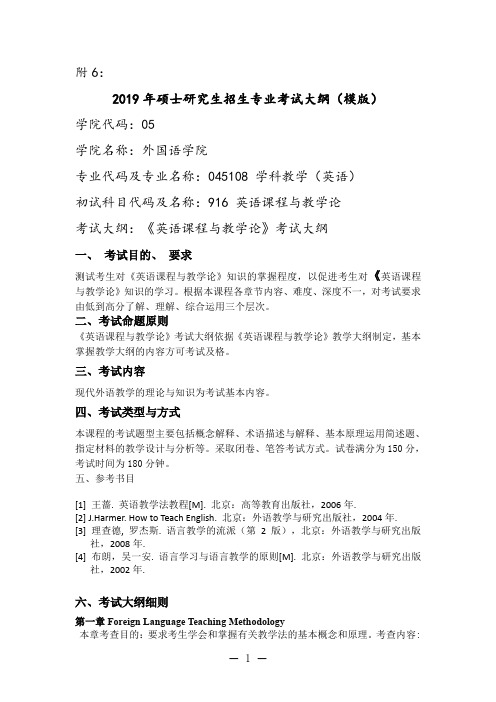
附6:2019年硕士研究生招生专业考试大纲(模版)学院代码:05学院名称:外国语学院专业代码及专业名称:045108 学科教学(英语)初试科目代码及名称:916 英语课程与教学论考试大纲:《英语课程与教学论》考试大纲一、考试目的、要求测试考生对《英语课程与教学论》知识的掌握程度,以促进考生对《英语课程与教学论》知识的学习。
根据本课程各章节内容、难度、深度不一,对考试要求由低到高分了解、理解、综合运用三个层次。
二、考试命题原则《英语课程与教学论》考试大纲依据《英语课程与教学论》教学大纲制定,基本掌握教学大纲的内容方可考试及格。
三、考试内容现代外语教学的理论与知识为考试基本内容。
四、考试类型与方式本课程的考试题型主要包括概念解释、术语描述与解释、基本原理运用简述题、指定材料的教学设计与分析等。
采取闭卷、笔答考试方式。
试卷满分为150分,考试时间为180分钟。
五、参考书目[1] 王蔷. 英语教学法教程[M]. 北京:高等教育出版社,2006年.[2] J.Harmer. How to Teach English. 北京:外语教学与研究出版社,2004年.[3] 理查德, 罗杰斯. 语言教学的流派(第2版),北京:外语教学与研究出版社,2008年.[4] 布朗,吴一安. 语言学习与语言教学的原则[M]. 北京:外语教学与研究出版社,2002年.六、考试大纲细则第一章Foreign Language Teaching Methodology本章考查目的:要求考生学会和掌握有关教学法的基本概念和原理。
考查内容:1. Understanding Foreign Language Teaching Methodology2. Disciplines Contributing to Foreign Language Teaching (FLT)3. Factors Influencing Foreign Language Teaching and Learning。
学科教学硕士(英语类)

学科教学硕士(英语类)
摘要:
一、学科教学硕士(英语类) 的定义和背景
二、学科教学硕士(英语类) 的课程设置
三、学科教学硕士(英语类) 的就业前景
四、学科教学硕士(英语类) 的优势与挑战
五、结论
正文:
学科教学硕士(英语类) 是一门以培养英语教育人才为目标的专业,旨在为我国英语教育领域培养具备扎实英语基础、先进教育理念和教学方法的高素质人才。
这一专业在我国已经有着较为成熟的体系,吸引了众多有志于从事英语教育事业的学子报考。
学科教学硕士(英语类) 的课程设置丰富多样,涵盖了英语语言知识、教育理论、教学方法、教育心理学等方面的内容。
学生在学习过程中,不仅可以提高自己的英语水平,还能掌握教育理论知识和实践技能,为将来的教学工作打下坚实基础。
毕业后,学科教学硕士(英语类) 的就业前景十分广阔。
他们可以在中小学、高校、教育培训机构等场所担任英语教师,也可以从事教育科研、教育管理等工作。
随着我国英语教育市场的不断壮大,这一专业毕业生的需求也在逐年上升。
然而,学科教学硕士(英语类) 也面临着一定的挑战。
首先,教育行业竞
争激烈,毕业生需要具备较强的综合素质和教育教学能力才能脱颖而出。
其次,英语教育领域不断变革,教师需要不断更新自己的知识和技能,以适应教育发展的需要。
综上所述,学科教学硕士(英语类) 是一门具有广泛就业前景和挑战的专业。
对于有志于从事英语教育事业的学子来说,报考这一专业无疑是一个明智的选择。
硕士研究生入学考试大纲--821英语语言学基础与英文写作

全国硕士研究生入学统一考试英语语言学基础与英语写作考试大纲目录I 考查目标 (1)II 考试形式和试卷结构 (1)III 考查内容 (1)IV. 题型示例及参考答案 (2)《英语语言学基础与英语写作》考试大纲I 考查目标全国硕士研究生入学统一考试自命题科目《英语语言学基础与英语写作》考试是为我校招收教育专业硕士学科教学(英语)方向研究生而设置的具有选拔性质的考试科目。
其目的是科学、公平、有效地测试考生是否具备攻读该专业方向所必须的基本素质、一般能力和培养潜能,以利用选拔具有发展潜力的优秀人才入学,为国家的经济建设培养具有良好职业道德、法制观念和国际视野、具有较强分析与解决实际问题能力的高层次、应用型、复合型的外语教育人才。
考试测试考生掌握主要语言学派的基础知识、语言学(包括各语言学分支)的基础知识、语言学理论的基本应用能力,考察学生掌握词汇的基本概念、构词法、词汇使用等,考察考生的英语写作能力,考查考生能运用这些概念与理论分析解决教学中与语言学有关问题的能力。
具体要求考生:应该理解并掌握语言学、词汇学、写作的基本属性及规律,掌握语言学定义、特征;语音学定义、特征、分类;音素、音位和音位变体及音位学规则;形态学、句法学、语义学、语用学的定义、分类、变化规则;语言的变化、语言与文化规则;二语习得及语言与大脑的基本概念和基本应用。
掌握词汇学定义、历史、形式、意义关系、词典应用、语篇词汇的理念和发展。
考察英语写作能力。
II 考试形式和试卷结构一、试卷满分及考试时间试卷满分为150分,考试时间180分钟。
二、答题方式闭卷、笔试,用英文解答各类试题,不容许使用各类词典。
三、试卷内容与题型结构正误判断(5个,每题2分,共10分)选择题(5个,每题2分,共10分)名词解释(6小题,每题5分,共30分)简答题(6小题,每题10分,共60分)英文写作(1题,共40分)假如每题分数有变化,变化范围亦不大。
III 考查内容1. 语言和语言学:语言和语言学的定义、范畴、识别特征、重要区分等。
全日制教育硕士学科教学英语专业学位硕士研究生培养定稿版

全日制教育硕士学科教学英语专业学位硕士研究生培养精编W O R D版IBM system office room 【A0816H-A0912AAAHH-GX8Q8-GNTHHJ8】全日制教育硕士(学科教学-英语)专业学位硕士研究生培养方案(专业代码:045108)一、培养目标总体要求:将学生培养成为既具有扎实英语基本功,深厚的英语学科知识和教育教学理论,又具有教育实践能力、教育研究能力与专业发展能力,为我国基础教育服务的高素质的英语教师与未来教育家。
具体要求如下:1.具有较高的思想素质、专业素质和人文素质,具有良好的公民道德意识和社会责任感,良好的心理素质、较强的适应能力以及善于合作的团队精神。
善于吸收国外先进思想和文化,为祖国的基础教育事业服务。
2. 了解并掌握国内外最前沿的外语教育教学研究动态,具有前瞻性思维能力和国际化的视野。
3. 系统掌握英语学科的基础知识和基本技能,具有坚实的英语教学基础理论知识,具备用英语从事教学实践的能力。
4. 能够综合运用所学的理论知识和教育科学研究方法进行外语教学研究,具有发现问题、分析问题和解决问题的能力。
二、学制与学分基本学制为二年,总学分不低于37学分。
三、培养方式在硕士生培养过程中,合理安排课程学习、论文工作和实践活动等各个环节。
1. 英语学科教育硕士的培养,计划采用基于教学实践平台的一体化的培养模式。
即实行全过程到中学的培养方式,采用“体验-理论提升-实践-反思”的教学方式,将实践体验和教学反思贯穿于教育硕士整个培养过程。
2. 实行大学和中学双导师制度,聘请优秀的中学英语教学名师为学生的教学实践指导教师,以师傅带徒弟的方式指导并训练学生的教学技能。
大学导师参与学生的整个培养过程,侧重对学生教育思想、教学理论、教学反思和教学研究的指导。
3. 规范论文写作要求及评价标准,鼓励学生将教学体验和教学实践过程中发现的问题作为学位论文的选题,以调查研究或行动研究的方式进行实证研究。
学科教学硕士(英语类)

学科教学硕士(英语类)摘要:1.学科教学硕士(英语类) 的定义与特点2.学科教学硕士(英语类) 的课程设置与培养方向3.学科教学硕士(英语类) 的就业前景与方向4.我国学科教学硕士(英语类) 教育的发展与现状正文:【一、学科教学硕士(英语类) 的定义与特点】学科教学硕士(英语类) 是针对英语学科的教学硕士,旨在培养具备较高英语水平、系统掌握英语教育理论和教学方法的人才。
该专业着重培养学生的英语教育教学能力、跨文化交际能力以及一定的学术研究能力。
学科教学硕士(英语类) 的特点主要有:注重实践教学、强化理论基础、培养跨文化交际能力以及提升学术研究水平。
【二、学科教学硕士(英语类) 的课程设置与培养方向】学科教学硕士(英语类) 的课程设置主要包括英语语言基础、英语教育理论、跨文化交际、英语教学法、教育技术与课程设计等。
培养方向主要为:英语教育教学、跨文化交际与国际交流、英语教育管理与研究等。
【三、学科教学硕士(英语类) 的就业前景与方向】学科教学硕士(英语类) 毕业生在教育行业具有较高的就业竞争力。
他们可以在中小学、高校、职业学院、语言培训机构以及国际学校等领域从事英语教育教学工作。
此外,他们还可以在教育行政部门、研究机构、出版机构、翻译公司等单位工作。
【四、我国学科教学硕士(英语类) 教育的发展与现状】我国学科教学硕士(英语类) 教育在近年来得到了快速发展。
目前,众多高校均设有英语教育硕士点,为我国培养了大量英语教育人才。
然而,在教育质量、课程设置、培养模式等方面仍存在一定问题,需要进一步改革和完善。
综上所述,学科教学硕士(英语类) 是一门具有广泛应用前景和较高社会需求的专业。
学科教学英语专硕考试科目
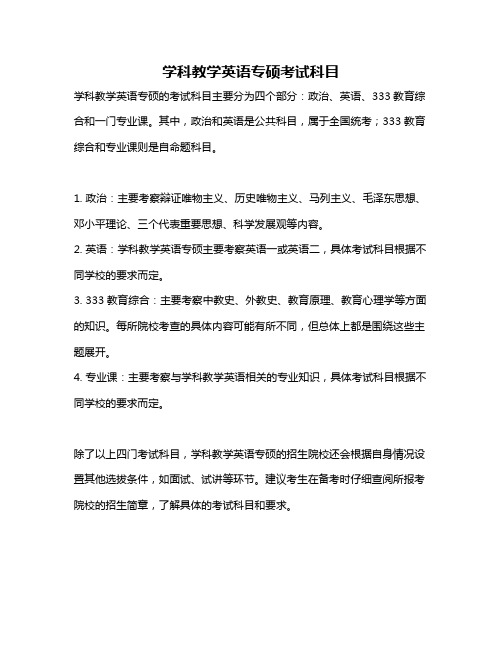
学科教学英语专硕考试科目
学科教学英语专硕的考试科目主要分为四个部分:政治、英语、333教育综合和一门专业课。
其中,政治和英语是公共科目,属于全国统考;333教育综合和专业课则是自命题科目。
1. 政治:主要考察辩证唯物主义、历史唯物主义、马列主义、毛泽东思想、邓小平理论、三个代表重要思想、科学发展观等内容。
2. 英语:学科教学英语专硕主要考察英语一或英语二,具体考试科目根据不同学校的要求而定。
3. 333教育综合:主要考察中教史、外教史、教育原理、教育心理学等方面的知识。
每所院校考查的具体内容可能有所不同,但总体上都是围绕这些主题展开。
4. 专业课:主要考察与学科教学英语相关的专业知识,具体考试科目根据不同学校的要求而定。
除了以上四门考试科目,学科教学英语专硕的招生院校还会根据自身情况设置其他选拔条件,如面试、试讲等环节。
建议考生在备考时仔细查阅所报考院校的招生简章,了解具体的考试科目和要求。
山东师范大学全日制教育硕士考研参考书目一览

山东师范大学全日制教育硕士考研参考书目一览本文系统介绍山东师大全日制教育硕士考研难度,山东师大全日制教育硕士就业方向,山东师大全日制教育硕士学费介绍,山东师大全日制教育硕士考研参考书,山东师大全日制教育硕士考研初试经验五大方面的问题,凯程山东师大全日制教育硕士老师给大家详细讲解。
特别申明,以下信息绝对准确,凯程就是王牌的教育硕士考研机构!五、山东师大全日制教育硕士考研参考书是什么?山东师大教育硕士考研参考书很多人都不清楚,这里凯程老师给大家整理出来了:333教育综合参考书:①教育学原理:《教育学》,王道俊、郭文安编人民教育出版社②中国教育史:《中国教育史》,孙培青编华东师范大学出版社《简明中国教育史》,王炳照等著北京师范大学出版社③外国教育史:《外国教育史》,张斌贤、王晨副编教育科学出版社④教育心理学:《教育心理学》,张大均编人民教育出版社《教育心理学》,陈琦、刘儒德编高等教育出版社以上参考书比较多,实际复习的时候,请按照凯程老师指导的重点进行复习,有些内容是不考的,帮助你减轻复习压力,提高复习效率。
四、山东师大全日制教育硕士考研辅导班有哪些?对于山东师大教育硕士考研辅导班,业内最有名气的就是凯程。
很多辅导班说自己辅导教育硕士,您直接问一句,山东师大教育硕士参考书有哪些,大多数机构瞬间就傻眼了,或者推脱说我们有专门的专业课老师给学生推荐参考书,为什么当场答不上来,因为他们根本就没有辅导过山东师大教育硕士考研,更谈不上有山东师大教育硕士考研的考研辅导资料,有考上山东师大教育硕士的学生了。
在业内,凯程的山东师大教育硕士考研非常权威,基本上考山东师大教育硕士的同学们都了解凯程,2015年共有166人考取目标院校。
凯程有系统的《333教育综合讲义》《333教育综合应试题库》《333教育综合应试解析》《333教育综合掌中宝》,也有系统的考研辅导班,及对山东师大教育硕士深入的理解和及时的考研信息。
不妨同学们实地考察一下。
免师教育硕士学科(英语)教育测量与评价课程作业答案最新版

免师教育硕⼠学科(英语)教育测量与评价课程作业答案最新版西南⼤学研究⽣课程考试答卷纸考试科⽬英语教育测量与评价院、所、中⼼外国语学院专业或专业领域英语研究⽅向英语学科教育级别学年学期姓名学号类别③教育硕⼠(①全⽇制博⼠②全⽇制硕⼠③教育硕⼠④⾼师硕⼠⑤⼯程硕⼠⑥农推硕⼠⑦兽医硕⼠⑧进修)2020年8 ⽉7 ⽇研究⽣院(筹)制备注:成绩评定以百分制或等级制评分,每份试卷均应标明课程类别(①必修课②选修课③同等学⼒补修课)与考核⽅式(①闭卷笔试②⼝试③开卷笔试④课程论⽂)。
课程论⽂应给出评语。
西南⼤学外国语学院公费师范教育硕⼠2020级“学科(英语)教育测量与评价”课程作业⼀、简答题(50分)1.测量的基本要素有哪些?答:测量的量具、测量的单位和测量的参照点,是测量的三个基本要素或三个基本条件。
2.什么是教育测量?答:教育测量,就是针对学校教育影响下学⽣各⽅⾯的发展,侧重从量的规定性上予以确定和描述的过程。
教育测量学是⼀门发展较早、应⽤较多、内容较丰富的教育科学分⽀。
3.教育测量有哪些量表类型?答:称名量表、顺序量表、等距量表和⽐率量表。
4.什么是教育评价?答:所谓教育评价( educational evaluation) ,是指按照⼀定的价值标准和教育⽬标,利⽤测量和⾮测量的种种⽅法系统地收集资料信息,对学⽣的发展变化及其影响学⽣发展变化的各种要素进⾏价值分析和价值判断,并为教育决策提供依据的过程。
5.教育测量与教育评价有什么不同?答:教育测量则是针对教育效果或者针对学⽣各⽅⾯的发展予以测量和描述的过程,旨在获得有⼀定说服⼒的数量事实,是⼀种以量化为主要特征的事实判断。
⽽教育评价是根据⼀定的标准,对教育事物或现象的价值进⾏系统的调查,在获取⾜够多的资料事实(定性资料与定量资料)基础上,作出价值分析和价值判断。
因此,教育评价最根本的特征是作出价值判断。
⽽教育测量过程的完结,在给出数量事实的描述与判断之后,不⼀定都要作出价值判断。
扬州大学外国语学院教育硕士专业学位(学科教学,英语)

学校自行命题
全国联考
政治理论
1、《辩证唯物主义和历史唯物主义原理》,李秀林主编;
2、“时势政治”
学校自行命题
教育学
在职攻读教育硕士专业学位全国统一(联合)考试大纲及指南(教育学),北京师范大学出版社
全国联考
心理学
在职攻读教育硕士专业学位全国统一(联合)考试大纲及指南(心理学),北京师范大学出版社
全国联考
英语语言学
1、取得国民教育序列大学本科毕业证书3年及以上;
2、有3年及以上工作经历
1、采取网上报名与现场确认相结合的方式;
2、每年7月中、下旬登录 进行网上报名;
3、每年7月下旬,考生到报名点进行报考信息确认、缴纳报名考试费、采集数码照片(报考我校的江苏省考生,只能在我校参加报名;报考我校的外省考生,到考生所在省省级主管部门指定地点报名考试)
1、全国联考时间:报考当年10月下旬(周六、周日)进行;
2、复试时间:一般在次年3月初
扬州大学外国语学院教育硕士专业学位(学科教学,英语)入学考试科目及参考书
招生类别
(代码)
专业、领域名称
初试
复试
教育硕士专业学位
()
(420100)
学科教学(英语)
考试科目参考书说明考来自科目参考书说明
英语二
在职攻读教育硕士专业学位全国统一(联合)考试大纲(英语二),北京师范大学出版社
扬州大学外国语学院教育硕士专业学位(学科教学,英语)报考条件及流程
招生类别
(代码)
专业、领域名称
招收对象
报考条件
报考方法
考试时间
教育硕士专业学位
- 1、下载文档前请自行甄别文档内容的完整性,平台不提供额外的编辑、内容补充、找答案等附加服务。
- 2、"仅部分预览"的文档,不可在线预览部分如存在完整性等问题,可反馈申请退款(可完整预览的文档不适用该条件!)。
- 3、如文档侵犯您的权益,请联系客服反馈,我们会尽快为您处理(人工客服工作时间:9:00-18:30)。
学科教学(英语)专业考生教育硕士英语
试题
学科教学(英语)专业考生教育硕士英语试题学科教学(英语)专业考生教育硕士英语试题part i structure and vocabulary section a
directions: beneath each of the following sentences, there are four choices marked a, b, c,
and d. read each sentence carefully and then choose one that best completes the sentence.
mark your answer on answer sheet i by drawing a single bar across the corresponding
letter in the square bracket. (10 points)
1. it c . that mary, no less than jenny and jane, really diligent and perseverant in doing
anything.
a. says ... is
b. said ... are
c. is said ... is
d. is said ... are
2. the tooth that is being extracted by the dentist me for
some time.
a. has hurt .
b. has been hurting
c. is hurting
d. hurts
3. i suppose jack is as johnson.
a. as wealthy a man
b. so wealthy
c. as a wealthy
d. a man so wealthy
4. i studied spanish for four years in high school. , i had trouble talking with people when
i was travelling in spain.
a. nevertheless
b. therefore
c. moreover
d. on the other hand
5. the blacks wasted a lot of food at the party last week. they so much food.
a. didn't need to prepare
b. mustn't have prepared
c. needn't have prepared
d. couldn't have prepared
6.it has provided is professional advice to help entrepreneurs get on their feet, to stay
on the ri 8. 49. popularght course, and to help them grow.
a. that
b. which
c. what
d. while
7. jerry continued to a promotion even though he had necessary qualifications.
a. have denied
b. be denied
c. deny
d. be denying
8.how unlucky i was in the table-tennis game yesterday! i was close but i lost it at last
because of my tiredness.
a. to win
b. winning
c. to winning
d. for winning
9. i would never have encouraged you to go into this field it would be so stressful for
you.
a. should i know
b. and i had known
c. but i knew
d. had i known
10. the headmaster persisted in punishing the boy and in no case _ _ change his mind.
a. he would
b. he were to
c. would he
d. were he to
学科教学(英语)专业考生教育硕士英语试题相关内容:。
